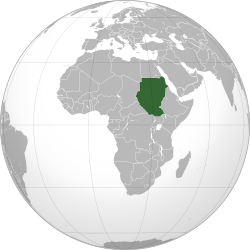LGBT rights in Sudan
From Wikipedia, the free encyclopedia
| LGBT rights in Sudan | |
|---|---|
 Sudan |
|
| Same-sex sexual activity legal? | Illegal: Sharia law applied (see below) |
|
Penalty:
|
Capital punishment for men on third offense; for women, death on fourth offense. |
| Recognition of relationships |
No recognition of same-sex relationships |
| Adoption | - |
| Military service | - |
| Discrimination protections | None |
Lesbian, gay, bisexual, and transgender (LGBT) persons in Sudan face legal challenges not experienced by non-LGBT residents. Both male and female same-sex sexual activity is illegal in Sudan.
Contents |
[edit] Laws against homosexual behaviour
Homosexual behaviour is illegal in Sudan. The judicial system is based on the Shari'a and according to Article 148, capital punishment applies should the offense be committed either by a man or a woman.
For homosexual men, lashes are given for the first offence, with the death penalty following the third offence.
100 lashes are given to unmarried women who engage in homosexual acts.[1] For lesbian women, stoning and thousands of lashes are the penalty for the first offence.
[edit] Sudanese tribal society
Siegfried Frederick Nadel, writing in the 1940s and 50s noted that among the Otoro, a special transvestitic role existed whereby men dressed and lived as women. Trasvestitic homosexuality also existed amongst the Moru, Nyima and Tira people, and reported marriages of Korongo londo and Mesakin tubele for the bride-price of one goat.
In these tribes with "widespread homosexuality and tranvesticism", Nadel reported a fear of heterosexual intercourse as sapping virility and a common reluctance to abandon the pleasure of all-male camp life for the fetters of permament settlement. "I have even met men of forty and fifty who spent most of their nights with the young folk in the cattle camps rather that at home in the village." In these pervasively homoerotic societies, the men who were wives were left at home with the women.
Among the Mossi, pages chosen from among the most beautiful boys aged seven to fifteen were dressed and had the other attributes of women in relation to chiefs, for whom sexual intercourse was denied on Fridays. After the boy reaches maturity he was given a wife by the chief. The first child born to such couples belonged to the chief[2].
Today, the issue has divided some religious communities. In 2006, Abraham Mayom Athiaan, a bishop in South Sudan, led a split from the Episcopal Church of Sudan for what he regarded as a failure by the church leadership to condemn homosexuality sufficiently strongly.[3].
[edit] See also
Template:"Freedom Sudan" The Sudanese LGBT Association
[edit] Footnotes
- ^ Spartacus International Gay Guide, page 1218. Bruno Gmunder Verlag, 2007.
- ^ S.F.Nadel, The Nuba, London: Oxford University Press, 1947.
- ^ Manyang Mayom, "South Sudan Anglican Church rejects tribalism and homosexuality", Sudan Tribune, 17 October 2006.
[edit] External links
- [1] "Freedom Sudan" The Sudanese LGBT Association.
- UK government travel advice for Sudan: Local laws and customs
- Africans and Arabs come out online, Reuters via Television New Zealand — includes Sudanese gay blogger
| This article about lesbian, gay, bisexual, or transgender-related law is a stub. You can help Wikipedia by expanding it. |
| This Sudan-related article is a stub. You can help Wikipedia by expanding it. |